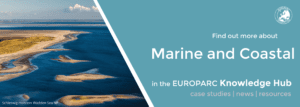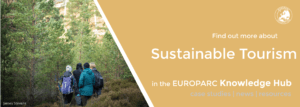Workshop outcomes: Why does our marine environment merit special attention?
Kornati National Park (HR) © Photo Najada Diving Ltd
During the ONLINE Conference 2020, EUROPARC held 8 thematic workshops to discuss diverse topics related to practice and capacity building in Protected Areas (PAs). In case you have not attended, or want to remind yourself of their outcomes, a series of articles summarises the content of some of these workshops.
Marine Protected Areas
The Marine workshop welcomed 22 participants from different backgrounds. At the start of the session, a short overview reminded us the importance of biodiversity in our lives, the main factors that are contributing to its decrease and how the Biodiversity Strategy aims to halt the biodiversity lost.
Especially, a brief review of the Biodiversity Strategy 2010’s targets concerning the marine environment was done, which stated that at least 10% of the sea surface should be protected by 2020, and a comparison of the goals with the current protections status.
Download the workshop introductory presentation delivered by Fernando Pinillos and Stefania Petrosillo from EUROPARC.
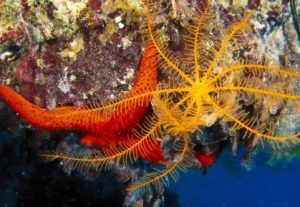
Torre Guaceto Marine Protected Area (IT) – Park Archive
A short review of the recently published Biodiversity Strategy 2030 followed with its implications for the marine environment and the management of Marine Protected Areas. This new release of the Biodiversity Strategy states three key aspects to be reached by 2030 that we considered of particular interest for the designation and management of MPAs across Europe:
- Increase the protection of the sea surface from the previous 10% to a 30%;
- Strictly protect the 10% of the marine surface;
- Achieve effectively managed MPAs.
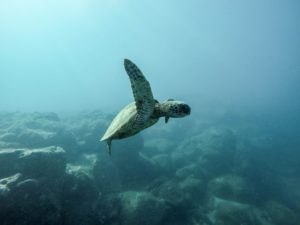
Photo: Jeremy Bishop
These three aspects raise different questions regarding the meaning of those protection levels – should the 30% be a common goal all over Europe, or for each region or country? Does strict protection mean no human activity is allowed, or no extraction, or any other meaning? What does effectively managed mean, and how it is measured?
These different concerns were raised after the introduction and discussed with the participants. Among the questions and comments received, the most important were related to the following:
- Should the 30% be a common goal all over Europe, or for each region or country?
- Does strictly protection mean no human activity is allowed, or no extraction, or any other meaning?
- What does effectively managed mean, and how it is measured?
LIFE INTEMARES project
“Needs and competencies for building the capacity of Marine Protected Area managers and stakeholders involved LIFE IP INTEMARES project (Spain)“ by Paloma Pacheco (LIFE IP INTEMARES project Coordinator).
INTEMARES project has scheduled 50 actions to be undertook before 2024, and has coordinated the design of over 80 MPA management plans, constituting one of the biggest integrated projects of this kind in Europe.
In this presentation, Paloma Pacheco explained how the INTEMARES project targets to designate and manage Marine Protected Areas in Spain covering the 18% of the sea surface of this country. Furthermore, she detailed how, through a participatory process that took place from 2017 to 2019, involved 2000 entities and used the Collective Intelligence software, they managed to identify the obstacles and needs that MPA stakeholders will need to overcome for an effective management of marine sites.
Discussion on capacity building
After the presentation, the floor was given to the participants that wanted to contribute and give answers to questions such as the implications of the Biodiversity Strategy 2030, what capacity building tools and programmes are needed for an effective MPAs co-management at all levels, and what practical competencies Protected Areas staff need to be able to do their work.
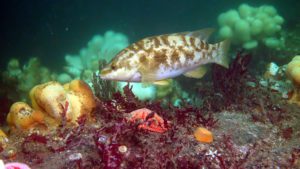
Ballan Wrasse, Arran Coast – photo by Howard Wood
Among the workshop outcomes, some relevant aspects were highlighted:
- Among the restoration actions, there is a need of rewilding big mammals and top predators, as their populations have decreased and they play a crucial role for a good functioning of ecosystems;
- The necessity of designating ecological corridors, and to set specific actions/legislation framework for transboundary areas and ecologically connected areas, as this is not only stated in the Biodiversity Strategy but also a known need to protect high mobile species;
- Lack of funding is not always the first issue when it comes to effective MPA management – this was collected during the INTEMARES participatory process. However, funding is necessary when immediate enforcement measures should be put into place;
- Among the different competencies that MPA managers and stakeholders should be trained in, conflict resolution is one of the priorities.
- Among the needs identified to effectively manage MPAs, it is critical to manage stakeholders expectations and to allow them to sit together to establish a conversation.
- Among the tools needed to improve competencies of MPA managers and stakeholders, is important to develop communication tools and active learning methodologies.
- Among the impacts arising from the new Biodiversity Strategy, it is important to differentiate between three levels of action, each of which requires different competencies:
- Designation of MPAs;
- Management of MPAs;
- Effective management of MPAs.
Workshop outcomes: Are we ready for ecotourism?
Photo: Delta Polet
During the ONLINE Conference 2020, EUROPARC held 8 thematic workshops to discuss diverse topics related to practice and capacity building in Protected Areas (PAs). In case you have not attended, or want to remind yourself of their outcomes, a series of articles summarises the content of some of these workshops.
Facing the new reality for tourism
In the Conference Workshop on “Sustainable Tourism: are we ready for ecotourism as the new future?” we talked about how the end of coronavirus lockdown created a rush to parks and green spaces to celebrate the end of confinement. People recognised that Protected Areas provide an added value, important for their health and wellbeing.
We also analysed the new visitors profiles, mostly domestic visitors, that the new reality has brought to parks this summer. We discussed on what new capacities and activities would the parks need to build on in order to provide these newcomers with the best-quality services and, at the same time, safe experiences.
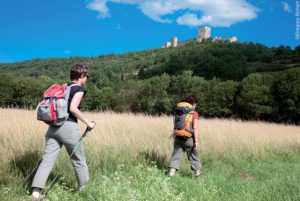
Photo: Sud Randos, ©Gregory Rohart
Concisely, these practical capacity building requirements of PAs and staff/organisational competencies will need to be developed to adapt to the new situation:
- Creative and innovative thinking, not only for visitor centres but also for managers. We might encounter new crisis and we need to think differently to deal with them.
- Social abilities: ability to meet and understand people and to avoid and solve potential conflict situations.
- Visitor knowledge and monitoring: need to know the visitors better, understand their behaviour, their needs and how to reach them – especially new audiences such as domestic visitors, who are different from tourists (they are more families’ type) and use different channels of communication.
- Services design thinking: in order to offer more sustainable services. It is important to know the “visitor’s path”: before, during and after the visit to the PA, in order to guarantee sustainability.
- Visitor management plans for large numbers: How to manage large numbers of people (parking lots crowded, excess of people in sensitive areas, etc.)? Need to apply new approaches.
- Effective communication. How to influence the behaviour of visitors effectively? How to deal with new audiences? How to make the most of this opportunity for encouraging new visitors)? Use of IT for real time info /communication contents.
- Partnership working. How to establish partnerships with stakeholders, touristic enterprises, etc.?
Furthermore, we heard two inspiring examples of how parks and sustainable tourism entities are actively adapting to the new situation by offering new services, with more creativity, and new ways of working.
Download the presentations
1: Cairngorms National Park (Scotland): Re-starting the visitor economy in the in the strangest season ever. #CairngormsTogether by Murray Ferguson.
2: Trentino Natura Sicura: how Trentino’s protected areas reshaped their offer in summer 2020 by Antonella Faoro.
For more information, please do not hesitate to contact Teresa Pastor, Project Development & Charter Sustainable Tourism Manager at EUROPARC Federation.
The Council of EU on the Farm to Fork strategy
Photo by Jan Kopřiva on Unsplash
The Council prioritises actions for sustainable food systems, find below the conclusions on the Farm to Fork strategy.
On 19th of October 2020, the Council of the European Union adopted a set of conclusions on the Farm to Fork strategy, endorsing the goal of developing a European sustainable food system, from production to consumption. The conclusions entail a two-fold political message from the member states:
- Ensure sufficient and affordable food while contributing to EU climate neutrality by 2050
- Ensure a fair income and strong support for primary producers.
The unanimous decision reached is a crucial signal and a clear commitment to a sustainable and economically viable agri-food sector. For the first time, the entire food system is taken into account as a whole – from producers to consumers. It is a solid starting point and we are looking forward to working altogether the coming years towards a truly sustainable and fair food system in Europe and beyond.
Says Julia Klöckner, Federal Minister for Food and Agriculture of Germany.
In the conclusions, member states recognise that European food is already a global standard for safety, nutritional value and high quality and, thus, they recognise the importance of promoting sustainability of food systems at a global level.
Comments from Member States
Some positive declarations from Member States can be reported. The importance of supporting local food systems was mentioned by several members, like Slovakia and Croatia. Croatia also mentioned the need to protect the diversity of genetic resources to protect agro-biodiversity. Malta welcomed the text concerning the Fisheries sector. Luxembourg and Finland welcomed the revision of the animal welfare regulation. France said that it will be crucial to arrive to consensus in European legislation in areas like pesticides. France, Spain called for consistency across different policies, like Trade. Spain, Luxembourg and others said that trade agreements with Not-EU countries should set up equitable rules for European producers and those outside EU too.
On labeling, Italy said that nutritional labeling is very sensitive, and more efforts are needed in raising awareness about balanced diets, but not to classify food as good or bad (although they also said that they are in favour of transparent information for consumers). Cyprus found labeling important for healthy and safe diets, so consumers can take reasoned decisions to look at the properties of the products. Spain also mentioned to be in favour of promoting responsible consumption.
However, the ministers express some cautions
The Council calls for scientifically-sound ex-ante impact assessments that have to be the basis of EU legislative proposals under the Farm to Fork strategy. About pesticides, antimicrobials and fertilisers, it asks to continue promoting the prudent and responsible use of in order to produce food sustainably and support the environment at the same time, despite the requests from the environmental sector to reduce drastically or completely quit their use. Finally, ministers call for a level playing field on competitive agri-food markets and compatibility with WTO rules, especially concerned about the competition with non-EU countries. A general request to the Commission is to proceed with impact assessments to evaluate possible major impacts in food security in the EU.
This compromised position can be considered a positive achievement of the German Presidency of the Council.
Nevertheless the main issue remains the coherence with the Common Agriculture Policy. Farm to Fork’s objectives and aspirational targets are, until now, not legally binding. Therefore they can be considered – the Council stressed – only just recommendations for the CAP National Strategic Plans that the Member States will need to prepare in the framework of the new CAP. To reinforce this point, the Member States called for higher flexibility to prepare their CAP strategic plans.
The same week, the Council, voting on the CAP, diluted the environmental and social ambition from 2018 Commission proposal, making it not in line with the European Green Deal, Farm to Fork and Biodiversity Strategies. In response, EUROPARC together with 26 other NGO’s wrote an open letter to President Ursula Von der Leyen urging the Withdrawal of the Commission proposal for the post-2020 Common Agricultural Policy
More:
Council Conclusions on the Farm to Fork Strategy, as approved by the Agriculture and Fisheries Council on 19 October 2020 can be found here.
The video of the debate can be found here.
[WEBINAR] Sustainable Tourism – Training for Tomorrow
This webinar on the 23rd of November at 14:00 CET will look at the new online tool to help learning about Sustainable Tourism in Protected Areas.
In this webinar, we’ll introduce an inspiring online learning platform, filled with key information on topics such as effective visitor communication, monitoring, conservation through tourism, reducing impacts and much more. It includes interesting European case studies, follow up resources and quizzes. The platform is targeted at anyone with an interest in sustainable tourism in Protected Areas.
Sign up here
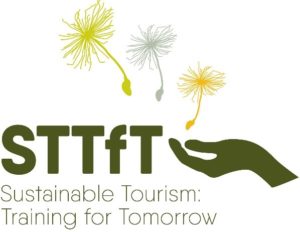
Agenda
Welcome
by Carol Ritchie, EUROPARC Federation
Guided tour on the platform
by Elke Hermans, Hasselt University, coordinator of the Erasmus+ STTfT project
Introduction of the platform containing new and inspiring material on sustainable tourism for protected area stakeholders
Testimonial of a platform user
by Sara Zappini, Terme di Rabbi (IT)
Case studies on Sustainable Tourism in Protected Areas
-
- Gomera Experience: an inspiring tool to promote ecotourism for businesses in La Gomera (Spain)
By Manuel Fernando Martín, Sustainable Tourism Association of La Gomera - Conservation through tourism – Mobilisation of volunteers for the creation and rehabilitation of mountain bike circuits
By Olaf Holm, Parc naturel regional de la Montagne de Reims
- Gomera Experience: an inspiring tool to promote ecotourism for businesses in La Gomera (Spain)
Let’s talk about it
All participants have the opportunity to exchange on the topics discusses and/or to ask questions.
Announcement “Train the Trainer” Event
Upcoming in 2021: an offer for potential trainers on Sustainable Tourism development in Protected Areas.
Get to know the speakers!
Carol Ritchie is the Executive Director of the EUROPARC Federation. She is responsible for the smooth running of all the Federation Directorate and its work. Carol operates across Europe to represent the Federation’s interest and to support the work of the President and Council.
Elke Hermans is professor in tourism and transport at Hasselt University in Belgium. Her teaching and research activities focus on sustainable tourism and transport. She is the coordinator of the Erasmus+ “Sustainable Tourism: Training for Tomorrow” project.
Sara Zappini is the Director of Terme di Rabbi, a thermal and wellness spa in the Stelvio National Park. Health, wellness and nature are her landmarks in managing the Thermae in the Rabbi Valley, which lays at the heart of the National Park.
Manuel Fernando Martín is the Vice president of the Sustainable Tourism Association of La Gomera, which collaborates with the Garajonay National Park and is committed to promoting sustainable tourism on the island.
Olaf Holm is the director of Parc naturel regional de la Montagne de Reims in France. The Park’s missions is to aim to protect and enhance its unique landscapes, natural and cultural heritage. Additionally, Olaf is a member of the EUROPARC council.
Sign up here
This webinar is powered by

